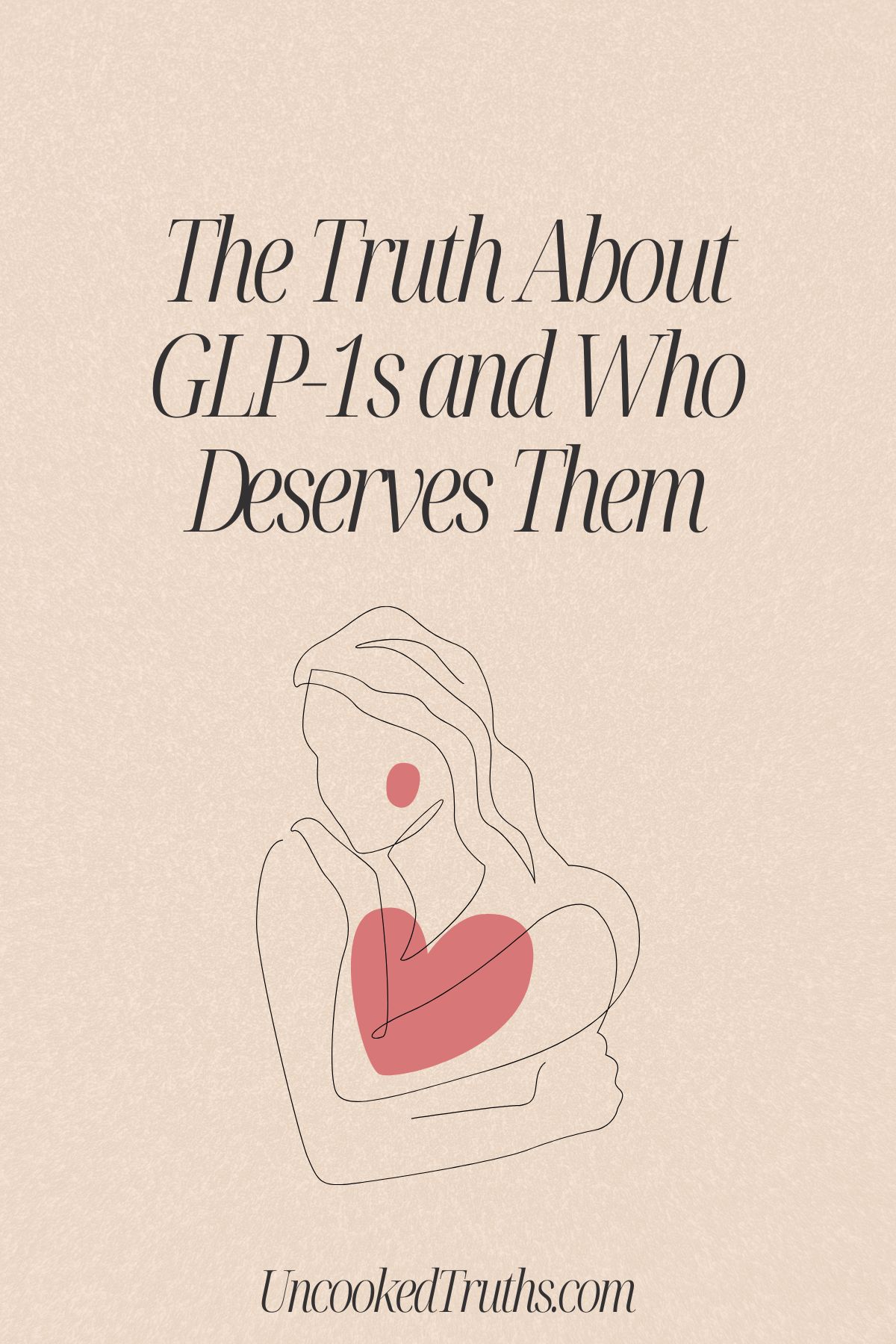Ever heard: ‘That’s just a diabetes drug’? ‘You didn’t really earn it? ’ Same here. This article is for anyone who’s felt shamed for using GLP‑1 meds and is done feeling apologetic.
We’ve been sold a story: if you’re not diabetic, you have no business needing real medical help with your weight. You just need more “willpower,” more “discipline,” and of course, more guilt.
But here’s the truth: GLP-1 medications like Mounjaro, Ozempic, or Wegovy aren’t cheat codes. They’re science. And they’re saving lives, not just lowering blood sugar. For those of us in midlife trying to fight off visceral fat, inflammation, crashing energy, and insulin resistance, these medications are the first thing that’s actually worked, and we’re not going to apologize for it.

The Problem Isn’t Just the Weight. It’s the Shame.
We were raised in the “no pain, no gain” era. Weight loss was supposed to hurt. But for many of us, midlife comes with fatigue, joint pain, and a body that no longer bounces back. I unpack what that shift feels like in this article about how my body stopped cooperating with traditional exercise.
You were supposed to suffer, grind, restrict, and punish yourself into smaller jeans. Now that a medication exists that can shut off the obsessive food noise in your head, it feels almost… criminal to use it. Too easy, too effective, they say, right?
So when someone gets better using a GLP-1, instead of support, they get side-eyes:
- “You didn’t earn it.”
- “That’s just a diabetes drug. You should not take it away from the sick people”
- “You’re just taking the easy way out.”
- "Calorie deficit works better than medication."
And let’s not ignore the other insult hiding underneath it all: “You’re not sick enough to need help.”
Obesity Is a Disease - Not a Moral Failure
Despite what we were taught in every ‘80s diet ad, obesity is not about laziness or lack of discipline.
The World Health Organization officially classified obesity as a disease long time ago.
So why are we still acting like it’s a personal failing? Let’s bust some of the most toxic myths:
- “They just need to eat less and move more.” This ignores how the body fights weight loss biologically, through hormones, insulin, and metabolic slowdown.
- “They’re lazy.” Most people with obesity have tried harder than anyone can imagine, and failed, over and over, not from lack of effort but because their biology was working against them.
- “They’re abusing a diabetes drug.” As if managing metabolic dysfunction, prediabetes, and inflammation doesn’t count as a valid medical need.
The deeper truth? We only value suffering and sacrifice. If you don’t sweat, starve, or collapse on the treadmill, your progress doesn’t count. That’s a lie. And it’s hurting people.
Our bodies are changing in real ways, and not always with helpful explanations. If you're navigating strange midlife symptoms, unexplained shifts, or just wondering what's still “normal,” you'll find more in my post on midlife body changes and the mystery symptoms no one warns you about.
What GLP-1s Actually Do (Hint: It’s Not Just Weight Loss)
Let’s get clear on the science. GLP-1 receptor agonists work by mimicking a hormone in your gut that:
- Stimulates insulin and reduces glucagon
- Slows gastric emptying (so you stay full longer)
- Tells your brain you’re not starving
- Lowers blood sugar
- Reduces inflammation and even improves some heart markers
It doesn’t melt fat. It silences the constant urge to eat, without white-knuckling every day. So no, this isn’t vanity medication. It’s metabolic therapy. For many, it’s the only thing that’s ever turned the volume down on their hunger and food obsession.
The Guilt of Getting Better
This one’s brutal. Many people who start GLP-1 meds feel an unexpected wave of shame. Because after decades of being told their only option was to try harder, this medication actually helps, and it feels like cheating.
It’s like we’ve been in a fight with our own bodies for so long that when something finally works, we don’t know how to accept it.
"You don’t have to suffer to be worthy of health. You’re allowed to get better."
Who Deserves Help?
Here’s the kicker: some folks still believe GLP-1s should only be used by people with type 2 diabetes. If you’re “just fat,” you need to earn access through more failure.
Let’s look at that logic:
- Do you have diabetes? You “deserve” it, as you did not take care of yourself.
- Are you prediabetic or insulin resistant? Not sick enough.
- Are you gaining visceral fat in menopause? You must be doing something wrong. Go for a walk. Eat less.
- Are you exhausted, inflamed, stuck? Try harder.
This is the hierarchy of shame we’ve built. And it’s absurd. If you’re suffering, if your quality of life is declining, if your metabolism is broken, you deserve help.
This Isn’t a Justification, it’s a Reality Check
No one owes anyone an explanation for how they manage their health. But silence breeds shame. These medications aren’t just for a select few; they’re part of a much bigger midlife story.
If you’re looking for more real talk about bodies, health, and identity after 40, here’s why I created Uncooked Truths, an honest blog for women in midlife who are done being quiet.
GLP-1 medications aren’t cheating. They’re liberation, for people who’ve tried everything else and are finally starting to feel like themselves again.
How to Talk to Your Doctor About GLP-1 Medications
If you’re not diabetic, it can feel intimidating to ask your doctor about these meds. Some are still stuck in the old belief that weight loss should only come from lifestyle change. Here’s how to approach the conversation:
1. Lead with symptoms, not weight. Say: “I’ve been struggling with metabolic issues, fatigue, belly fat, blood sugar swings, and nothing seems to work”.
2. Be specific about what you’ve tried. List diets, exercise, fasting, supplements, etc. You’re not jumping on a fad, you’re making an informed decision.
3. Use medical language. Say: “I understand GLP-1s can help with insulin resistance, appetite regulation, and inflammation. Could we explore whether this fits my case?”
4. Reference labs or risk factors. High fasting insulin, borderline A1C, cholesterol, family history, PCOS, and menopause-related metabolic changes are valid reasons.
5. Prepare for pushback. If your doctor brushes you off or tries to guilt you, that’s a red flag. You deserve a provider who sees the full picture, not just your BMI.
If you’re not diabetic, you’re still allowed to get better. You’re allowed to unlearn the guilt. You’re allowed to reclaim your health without starving for it. GLP-1s don’t erase your effort. They make that effort finally count.
More readings to do
- Food Noise or Hunger? How to Tell the Difference
- GLP-1 Weight Loss: Why You Should Wait to Buy New Clothes
- GLP-1 Life
- 8 Quiet Ways to Dismantle the Patriarchy






Leave a Reply